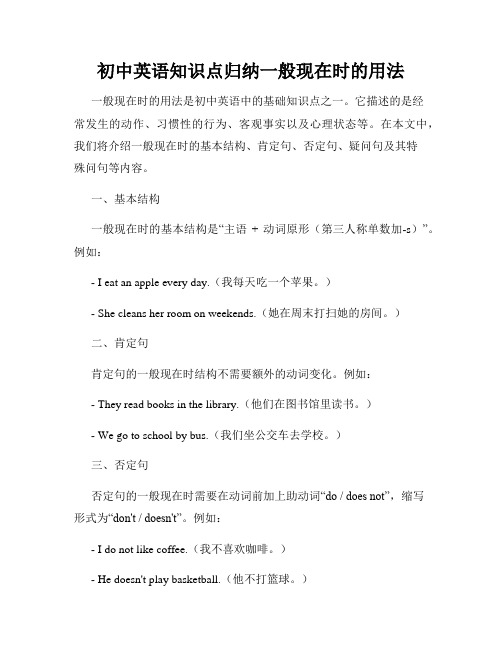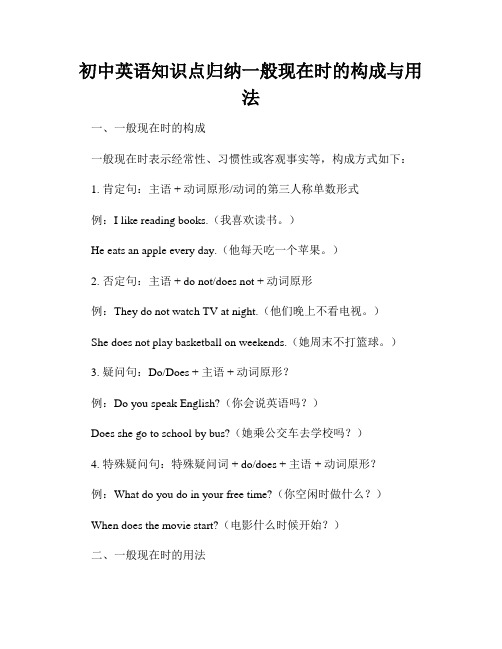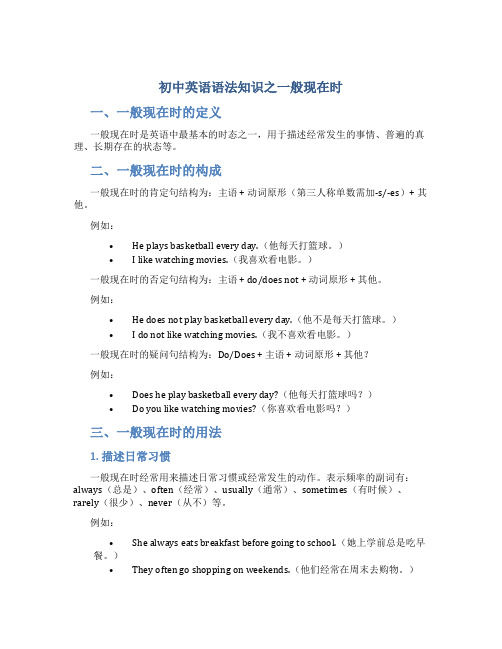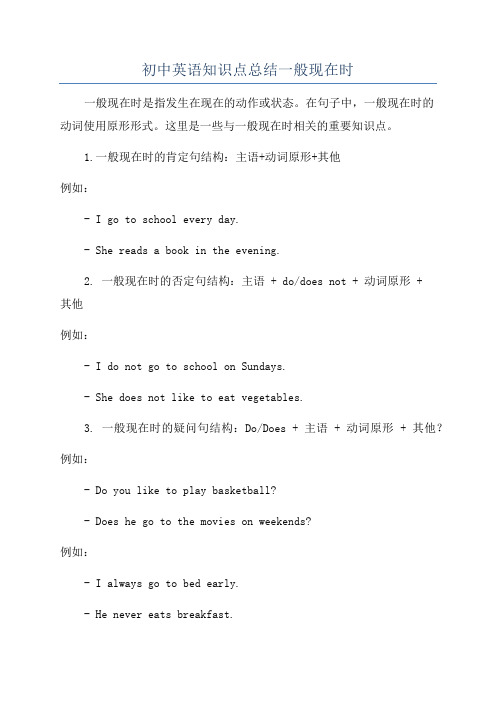初中英语一般现在时
初中英语时态归纳

初中英语时态归纳
初中英语时态主要包括一般现在时、现在进行时、一般过去时和一般将来时。
1. 一般现在时:表示经常性或习惯性动作,常与表示频度的时间状语连用,如always, usually, often, sometimes, every week (day, year, month…), once a week, on Sundays等。
基本结构是be动词(am/is/are)+动词原形。
否定形式是在be动词后加not,疑问句则把be动词放在句首。
2. 现在进行时:表示现阶段或说话时正在进行的动作及行为,常与now, at present, these days等时间状语连用。
基本结构是be 动词+动词的现在分词。
疑问句则把be动词放在句首。
3. 一般过去时:表示过去某个时间里发生的动作或状态,也表示过去习惯性、经常性的动作、行为。
常与表示过去的时间状语连用,如yesterday, last night, the other day等。
基本结构是be动词的过去式或行为动词的过去式。
4. 一般将来时:表示将来要发生的动作或状态,也表示将来经常或反复发生的动作,常与tomorrow, next year等时间状语连用。
基本结构是be动词的将来式或行为动词的将来式。
此外,还有现在完成时和过去完成时等时态。
如需更多信息,建议查阅英语语法书籍或咨询英语老师。
初中英语语法之---一般现在时

He_d_o_e_s_n_’t__st_a_y(not stay) at home on Saturdays. Lucy _d_o_e_s_n_’t__h_a_v_e(not have) sports every day.
morning.
(一)第三人称单数
用一句话概括:“非你、非我、非复数” 如 he, she, it, my father, my mother, my sister, our English teacher, Tom, Mike, Liu Jia, China, my book, etc.
she he it ;单个人名、地名;单数可数名词或者 this/that/the+单数可数名词;不定代词someone somebody,nobody,everything,something, anything;不可数名词;数字和字母
How old _a_r_eyou? Where a_r_e_ they ?
小结:be 动词的一般现在时的句式: ☺肯定句:主语+be+表语(n., adj.等)
☺否定句:主语+be+ not+表语.
☺一般疑问句:Be+主语+表语?
☺特殊疑问句:疑问词+be+主语?
2.实义动词的一般现在时句式: ☺肯定句: 主语(非三单)+v.原形+其他. 1) I _s_ta_y___ (stay) at home on Saturdays. 2) They h__a_v_e_ (have) sports every day. 3) My parents _g_iv_e_(give) me ten yuan
初中英语知识点归纳一般现在时的用法

初中英语知识点归纳一般现在时的用法一般现在时的用法是初中英语中的基础知识点之一。
它描述的是经常发生的动作、习惯性的行为、客观事实以及心理状态等。
在本文中,我们将介绍一般现在时的基本结构、肯定句、否定句、疑问句及其特殊问句等内容。
一、基本结构一般现在时的基本结构是“主语+ 动词原形(第三人称单数加-s)”。
例如:- I eat an apple every day.(我每天吃一个苹果。
)- She cleans her room on weekends.(她在周末打扫她的房间。
)二、肯定句肯定句的一般现在时结构不需要额外的动词变化。
例如:- They read books in the library.(他们在图书馆里读书。
)- We go to school by bus.(我们坐公交车去学校。
)三、否定句否定句的一般现在时需要在动词前加上助动词“do / does not”,缩写形式为“don't / doesn't”。
例如:- I do not like coffee.(我不喜欢咖啡。
)- He doesn't play basketball.(他不打篮球。
)四、疑问句疑问句的一般现在时需要将助动词“do / does”置于句首,并将主语与动词的位置互换。
例如:- Do you have a pen?(你有一支钢笔吗?)- Does she watch TV every evening?(她每天晚上看电视吗?)五、特殊疑问句特殊疑问句的一般现在时需要以特殊疑问词(如what, where, when, why, how等)开头,并按照疑问句的结构进行构建。
例如:- What do you do in your free time?(你在空闲时间都做些什么?)- How often does he go swimming?(他多久去游泳一次?)六、陈述句、否定句和疑问句的转换为了让学生更好地理解一般现在时的用法,可以通过转换不同的句子形式来练习。
初中英语知识点归纳一般现在时的构成与用法

初中英语知识点归纳一般现在时的构成与用法一、一般现在时的构成一般现在时表示经常性、习惯性或客观事实等,构成方式如下:1. 肯定句:主语 + 动词原形/动词的第三人称单数形式例:I like reading books.(我喜欢读书。
)He eats an apple every day.(他每天吃一个苹果。
)2. 否定句:主语 + do not/does not + 动词原形例:They do not watch TV at night.(他们晚上不看电视。
)She does not play basketball on weekends.(她周末不打篮球。
)3. 疑问句:Do/Does + 主语 + 动词原形?例:Do you speak English?(你会说英语吗?)Does she go to school by bus?(她乘公交车去学校吗?)4. 特殊疑问句:特殊疑问词 + do/does + 主语 + 动词原形?例:What do you do in your free time?(你空闲时做什么?)When does the movie start?(电影什么时候开始?)二、一般现在时的用法一般现在时用于以下几种情况:1. 表示经常性或习惯性的动作或状态。
例:My mother often cooks dinner for us.(我妈妈经常给我们做晚饭。
)We usually go to the park on weekends.(我们通常在周末去公园。
)2. 表示客观事实、自然规律或科学真理。
例:The sun rises in the east.(太阳从东方升起。
)Water boils at 100 degrees Celsius.(水在100摄氏度沸腾。
)3. 表示现有状况或个人特征。
例:I have two cats.(我有两只猫。
)She lives in London.(她住在伦敦。
初中英语一般现在时知识点

初中英语一般现在时知识点一般现在时是指在现在发生或存在的动作、状态和习惯。
以下是一般现在时的知识点:1. 形式:一般现在时的形式为主语 + 动词原形(或第三人称单数形式)、主语 + be动词原形(am, is, are)+ 动词-ing形式。
2. 第三人称单数形式:当主语是第三人称单数(he, she, it)时,动词要加 -s或 -es。
例如:She likes to play the piano.3. be动词的使用:be动词表示临时状态、习惯性状态和现有派生动词的被动语态。
例如:I am a student. They are playing soccer. The book is being read.4. 动词的形式变化:有些动词在一般现在时态中有特殊的形式变化。
例如:go -> goes, do -> does, have -> has。
5. 可数名词和不可数名词:可数名词使用单数形式,不可数名词使用单数或不变形式。
例如:She has two cats. I have a lot of water.7. 表示真理、自然现象和客观事实:一般现在时也可以用来表示真理、自然现象和客观事实。
例如:The sun rises in the east. Water boils at 100 degrees Celsius.8. 表示未来时间:一般现在时有时也可以用来表示未来安排或时间表中的事件。
例如:The train leaves at 6 o'clock tomorrow.9. 否定句和疑问句:一般现在时的否定句结构为主语 + donot/does not + 动词原形。
疑问句结构为Do/Does + 主语 + 动词原形。
以上是一般现在时的主要知识点,通过学习和掌握这些知识点,你就能正确运用一般现在时来描述现在的动作、状态和习惯。
初中英语语法知识之一般现在时

初中英语语法知识之一般现在时一、一般现在时的定义一般现在时是英语中最基本的时态之一,用于描述经常发生的事情、普遍的真理、长期存在的状态等。
二、一般现在时的构成一般现在时的肯定句结构为:主语 + 动词原形(第三人称单数需加-s/-es)+ 其他。
例如:•He plays basketball every day.(他每天打篮球。
)•I like watching movies.(我喜欢看电影。
)一般现在时的否定句结构为:主语 + do/does not + 动词原形 + 其他。
例如:•He does not play basketball every day.(他不是每天打篮球。
)•I do not like watching movies.(我不喜欢看电影。
)一般现在时的疑问句结构为:Do/Does + 主语 + 动词原形 + 其他?例如:•Does he play basketball every day?(他每天打篮球吗?)•Do you like watching movies?(你喜欢看电影吗?)三、一般现在时的用法1. 描述日常习惯一般现在时经常用来描述日常习惯或经常发生的动作。
表示频率的副词有:always(总是)、often(经常)、usually(通常)、sometimes(有时候)、rarely(很少)、never(从不)等。
例如:•She always eats breakfast before going to school.(她上学前总是吃早餐。
)•They often go shopping on weekends.(他们经常在周末去购物。
)2. 表达客观事实或普遍真理一般现在时也被用来表达客观事实或普遍真理。
例如:•The Earth revolves around the sun.(地球绕太阳运行。
)•Water boils at 100 degrees Celsius.(水在100摄氏度沸腾。
初中英语知识点总结一般现在时

初中英语知识点总结一般现在时一般现在时是指发生在现在的动作或状态。
在句子中,一般现在时的动词使用原形形式。
这里是一些与一般现在时相关的重要知识点。
1.一般现在时的肯定句结构:主语+动词原形+其他例如:- I go to school every day.- She reads a book in the evening.2. 一般现在时的否定句结构:主语 + do/does not + 动词原形 +其他例如:- I do not go to school on Sundays.- She does not like to eat vegetables.3. 一般现在时的疑问句结构:Do/Does + 主语 + 动词原形 + 其他?例如:- Do you like to play basketball?- Does he go to the movies on weekends?例如:- I always go to bed early.- He never eats breakfast.5. 表示客观真理、规律或常识时,一般现在时可用于所有人称,不需要使用助动词do/does。
例如:- The sun rises in the east.- Water boils at 100 degrees Celsius.6. 当主语为第三人称单数时,动词需要变化。
一般情况下,加上-s 或-es。
例如:- She eats lunch at 12 o'clock.- The dog barks loudly.7.部分动词在第三人称单数时需要做变化- go→goes- do→does- have→has例如:- He goes to school by bus.- She does her homework every day.- My mother has a pet cat.8. 当主语为we, they, you或复数名词时,动词不需要做变化。
初中英语语法知识之一般现在时

初中英语语法知识之一般现在时有很多同学分不清时态,时态是一篇文章的主线,如果时态都分不清那我们就分不清事情发生的先后,会对我们做题设障碍,所以今天小编为大家整理了一些时态上的知识,希望能帮到大家。
一般现在时表示现在经常反复发生的动作、存在的状态或习惯性的动作的时态。
一、一般现在时用法如下:1.表示现在的状态: e.g. He’s twelve. She’s at work.2.表经常或习惯性的动作,常与表示频度的时间状语连用。
: eg. I get up at 6:30 every day.He reads English every morning.3.表主语具备的性格、能力和特征。
e.g. I don't like this book.4.表示客观事实和普遍真理。
The earth moves around the sun.5. 在时间状语从句和条件状语从句中,常用一般现在时代替将来时。
eg. I'll write to you as soon as I arrive there.二、一般现在时构成:一般现在时用行为动词的原形,但第三人称单数作主语时,动词要用第三人称单数形式。
第三人称单数形式的变化规则是:1.一般的动词词尾+S。
2.以sh/ch/s/x 结尾的词+es.3.以辅音字母+Y 结尾的把 Y 变成 i,+es。
4.辅音字母+o 结尾的+es.基本结构:1.be 动词肯定句:主语+be(am,is,are)+其它。
如: I am a boy.我是一个男孩。
否定句:主语+ be + not +其它。
如:He is not a worker.他不是工人。
一般疑问句:Be +主语+其它。
如:-Are you a student? -Yes. I am. / No, I'm not.特殊疑问句:疑问词+一般疑问句。
如:Where is my bike?2.行为动词1) 当主语为第一,二人称及复数时,助动词为 do肯定句:主语+动词原形(+其它)。
- 1、下载文档前请自行甄别文档内容的完整性,平台不提供额外的编辑、内容补充、找答案等附加服务。
- 2、"仅部分预览"的文档,不可在线预览部分如存在完整性等问题,可反馈申请退款(可完整预览的文档不适用该条件!)。
- 3、如文档侵犯您的权益,请联系客服反馈,我们会尽快为您处理(人工客服工作时间:9:00-18:30)。
一般如今时讲授和演习一. 界说:一般如今时暗示经常或习惯性的动作,也可暗示如今的状况或主语具备的性情和才能.例:(1).暗示事物某人物的特点.状况.The sky is blue.天空是蓝色的.(2).暗示经常性或习惯性的动作.I get up at six every day.我天天六点起床.(3).暗示客不雅实际.The earth goes around the sun.地球绕着太阳转.二.一般如今时经常应用时光状语.时光副词in the morning/afternoon/eveningevery week (day, year, month…)on Sundays (Monday, Tuesday…)at night, once a week,.always老是, usually平日, often经常, sometimes有时, never从不三.用法:1.确定句:(1)句中有be(am,is,are)和情态动词时,①be动词时,主语是I时要用am,主语是you时要用are,其他用is.②是情态动词时,后面的动词用原型③例:I am a student.You are very beautiful.She is my best friend.He can do his homework by himself.(2)没有be(am,is, are)动词和情态动词:主语为第三人称单数(she ,he ,it ).单数可数名词.不成数名词的,动词要按规矩加上s或es;主语是复数可数名词的确定句,动词用本相.例:①She(He, It )likes fish. 她(他,它)爱好鱼.(主语为第三人称单数)②The table has four leg s.桌子有四条腿.(主语为单数可数名词)③Water boils at 100 degrees Celsius.水在100度沸腾.(主语为不成数名词)They go to school every day .他们天天都去上学.(主语是复数可数名词的,动词用本相)留意的问题:第三人称单数以及第三人称单数时动词的变更规矩在一般如今时中,当主语是第三人称单数时,谓语动词要用第三人称单数情势,即常在动词本相后加-s或-es.但有些同窗们对于哪些主语是第三人称单数还不十分清晰,现归纳总结如下:1.人称代词he, she, it是第三人称单数.如:He likes watching TV. 他爱好看电视.She has lunch at twelve. 她十二点吃午餐.It looks like a cat. 它看起来像只猫.2.单小我名.地名或称呼作主语;是第三人称单数.如:①Han Mei looks like her mother. 韩梅看起来像她的母亲.②Beijing is in China. 北京在中国.③Uncle Wang often ma kes cakes. 王叔叔经常做蛋糕.3.单数可数名词或"this / that / the+单数可数名词"作主语时,是第三人称单数.如:①A horse is a useful animal. 马是有效的动物.②This book is yours. 这本书是你的.③That car is red. 那辆小汽车是红色的.④The cat is Lucy's. 这只猫是露茜的.4.不定代词someone, somebody, nobody, everything, something等及指导代词this, that作主语时,是第三人称单数.如:①Everyone is here. 大家到齐了.②There is something wrong with the watch. 这块手表有缺点.③This is a pen. 这是一支钢笔.④That is an eraser. 那是一块橡皮擦.5.不成数名词作主语时为第三人称单数.如:①The milk is in the glass. 牛奶在玻璃杯里.②The bread is very small. 那面包很小.6.当数字或字母作主语时,看作第三人称单数.如:①"6" is a lucky number. "6"是个吉利数字.②"I" is a letter. "I"是个字母.动词+s的变更规矩1.一般情形下,直接加-s,如:cook-cooks, make-makesruns gets likes collets takes plays climbs2.以s. x. sh. ch. o结尾,加-es,如:guess-guesses, wash-washes, watch-watches, go-goes3.以“子音字母+y”结尾,变y为i, 再加-es,如:study-studies办法与发音:1.一般情形下,直接加-seg. works, plays, rains, sees2.以sh, ch, s, x 或o 结尾的词后加–eseg. washes, teaches, fixes, does, goes3.以子音字母加-y 结尾的,先把‘y’ 改成‘i’, 再加-eseg. studies, flies, carries留意: 动词加-s 今后的读音.动词加-s后的读音1.在[p] [t] [k] [f] 等清子音后, 发清子音/s/eg. helps, works, likes, hates ,laughs2.在浊子音和元音后, 发浊子音/z/eg. drives, cleans, plays3.在[s] [z] [∫ ] [tʃ] [dʒ]后, 发/iz/rises, wishes, teaches, urges 4.在[t] [d]后,发/ts/ /dz/eg. fits, sets, needs5. 其他情形下发[z]eg. plans, cries, shows演习1❖1.Jenny _____ in an office. Her parents _____in a hospital.❖ A work; works B works; work C work; are working D is working; work❖2.One of the boys_______ a black hat.❖ A have B there is C there are D has❖3.Wang Mei ______ music and often ______ to music.❖ A like; listen B likes; listens C like; are listening D liking ; listen❖ 4. Jenny______ English every evening.❖ A has study B studies C study D studied❖ 5. The teachers ________(speak) English in class.❖ 6. The teacher ________(speak) English in class.2. 否认句:(1)句中有be动词(am , is , are )或情态动词(may , can , must , should)时,否认句在be动词和情态动词后加not,I am not a teacher. He can not fly .(2) 句中没有be动词(am , is , are )或情态动词(may , can , must , should)时,主语为第三人称单数的否认句,在动词本相前加does + not (doesn’t).He doesn’t like cats.(3)句中没有be动词(am , is , are )或情态动词(may , can , must , should)时,主语为复数可数名词的否认句,在动词本相前加do + not (don’t).They don’t go to school on Sundays.演习2❖ 1. The cat _________(not like) you.❖ 2.Brian(not live) in China.❖ 3.The picture ______ nice.❖ A. don’t look B. is looked❖ C. doesn’t look D. is looking❖ 4. I have many books.(改为否认句)_________________________❖ 5.厦门不下雪.__________________________________________❖ 6.她不看消息.__________________________________________❖3.疑问句:(1)句中有be动词(am , is , are )或情态动词(may , can , must , should)时,一般疑问句将be动词或情态动词放在句首.由确定句变成一般疑问句的步调:①. 把be 动词(am , is , are )或情态动词(may , can , must , should)提前.②.大写和小写的转换,句首的第一个字母要大写.③.句末要加问号.例:确定句:She is a student . 疑问句:Is she a student ?确定句: He can swim. 疑问句:Can he swim? .疑问句的答复:用什么问就用什么来答复.Is she a student ? Yes, she is . No,she isn’t.Can you swim? Yes, I can . Yes, I can’t.(2) 句中假如没有be动词(am , is , are )或情态动词(may , can , must , should)时,主语为第三人称单数(she ,he ,it ).单数可数名词.不成数名词的疑问句要用does 来提问.即在句首加does,句子华夏有动词用本相例:—Does he like Chinese? 他爱好汉语吗?—Yes, he does. 是的,他爱好(汉语).—Does a dog eat meat? 狗吃肉吗?—No, it doesn’t. 不,它不吃(肉).(3) 句中假如没有be动词(am , is , are )或情态动词(may , can , must , should)时,主语为复数可数名词的疑问句要用do 来提问.Do you like monkeys? No, we don’t.Do students study Englsih ? Yes , they do.同时还要留意在确定句变成否认句时,若是遇I/we→you,my→your.Some→any.句号→问号(?)Does your cat eat any fruits? 你的猫吃生果吗?演习3❖ 1.________she ________ (do) the housework every day?❖ 2. Does Jenny(has) a good friend?❖Yes, she _______. (have) No. she _________. (not have)❖ 3. ________ you study English at school?Yes, I ____ (do).❖ 4.______ your sister study English at school?No, she______ (do)❖ 5. She lives in a small town near New York.(改为一般疑问句)____________________________________________________ ❖ 6.我天天都必须来吗?_________________________________________________❖7.你爸爸天天早上都看报纸吗?__________________________________________4.特别疑问句:特别疑问词+ am/is/are + 响应的人称/ + 其他do + 人称+ 动词本相+ 其他What/Where/Who/When/Which/why/how/whose… + am/is/are + 响应的人称/名词+ 其他What/Where/Who/When/Which/why/how/whose… + do/does + 响应的人称/名词+ 动词本相+ 其他❖Who are you? 你是谁?❖Why is your mother so busy?❖你妈妈为什么这么忙?❖How are you? /is your dad? 你好吗?你爸好吗?❖What does he do everyday?❖他天天做什么?❖When does your father go to work every day?❖你爸爸天天什么时刻去上班?❖Who studies very hard in our class?❖我们班谁进修异常尽力?❖Which computer games do you like?❖你爱好那种电脑游戏?演习题4❖ 1. Where ___you___ (have) lunch every day?❖ 2. Who_____(想要)to go swimming?❖ 3. Why _____ Tom absent today? (be)❖ 4. I often play football on Friday afternoon? 就划线部分提问________________________________________________❖ 5. Lily waters the flowers everyday.________________________________________________❖ 6.为什么她天天都那么早去上学?________________________________________________❖7.他带的是谁的眼镜?________________________________________________课后巩固演习题(完成时光:20分钟)一.按照请求改写句子1.This is my pencil ? (变一般疑问句)2. These red socks are Kate’s . (变一般疑问句)3. I want to buy a big green bag . (变特别疑问句 )4. Mary does not have any books . (变确定句)5. The clothing shop is on sale . (变成否认句)6. She likes the black bag very much . (变成否认句)7. I buy the pants for only 50 Yuan. (用she改写句子)8. It’s an English dictionary . (对画线部分提问)9. Lily and Lucy are fifteen years old now . (对画线部分提问)10. Her dog is 2 years and 5 months old . (变成否认句)11. I usually get up at seven o’clock . (用he改写句子)12. He often has hamburger and apples for dinner . (变成一般疑问句)13. My family always like thrillers . (对画线部分提问)14. Jane’s sister wants to see the comedy . (变成一般疑问句)15. Maria and Jack come to this school on Monday .(对画线部分提问)二.完成句子1. 他天天六点钟起床. He ______ _____ _______ six every morning.2. 小明经常去郊游. Xiao Ming _________ ________ hiking.3. 她老是在礼拜天探望爷爷奶奶.She _______ __________her grandparents on Sundays.4. Sandy周末上学吗? _______ Sandy _______ _______school on weekends?5. 他什么时刻去上班? When ________ he go to ________?6. 李云爱好秋天,不爱好冬天. Li Yun _________ autumn, but he _________ like winter.7. 今天的气象怎么样?What’s the _________ like _________?8. 她有电脑吗? ___________ she __________ a computer?9. Sue 有一本有味的故事书. Sue ________ _______ an _________ ________ book.三.be动词填空.1. ________you Li Fen ? No, ________ not .2. ________ Mr. green very busy? Yes , he ________.3. He must ________ at home .4. Comedy ________ very interesting .5. What ________ class you in ?6. You and I ________ good friends .7. His friends________ very funny .8. The twins ________ very happy because they want to go to a movie .9. Our class________ big , but their class ________ small .10. The basketball club________ exciting and fun .四.用所给动词的恰当情势填空.1. My classmate ________ (know) the man on the bike .2. His sister usually ________ (go) to school at 7:00 am .3. Lin Tao ________ (like) his new sweater .4. Let me ________ (have) a look .5. Let’s ________ (play) tennis !6. he ________ (like) English ?7. I want ________ (go) to a movie .8. He ________ (not know)the teacher’s nam e .9. Nice ________ (meet) you !10. Can I ________ (ask) the policeman ?11. ________ (sit) down and ________ (have) a cup of tea .12. ________ (not look) at your book !13. you ________ (can see)the bananas on the table ?14. I need ________ (buy ) some new clothes .15. She likes ________ (play) chess .英语冷笑话(二)Money doesn't grow on trees. But it grows at our branches. (某银行告白)Child: Mummy, can I get out to play?Mother: With those holes in your trousers?Child: No, with the girl next door.谐音“笑”果A bicycle can't stand on its own because it is two-tyred. (too tired)。
